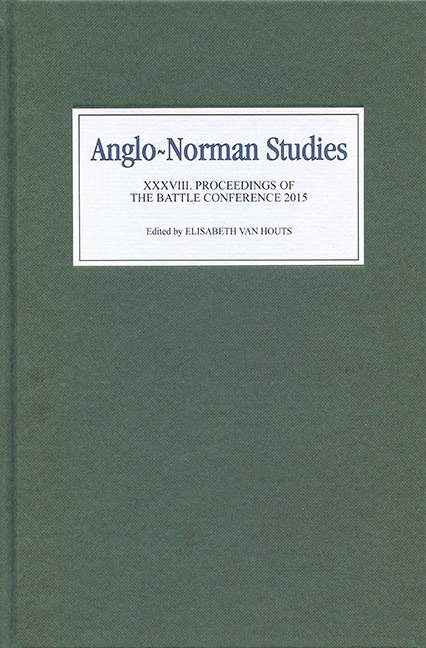Book contents
- Frontmatter
- Contents
- Illustrations and Tables
- Editor's Preface
- Abbreviations
- From the Articles of the Barons to Magna Carta (The R. Allen Brown Memorial Lecture, 2015)
- Jews in the Glosses of a Late Twelfth-Century Anglo-Norman Gratian Manuscript (Cambridge, Gonville and Caius College, MS 283/676)
- Monastic Autonomy, Episcopal Authority and the Norman Conquest: The Records of Barking Abbey (The Marjorie Chibnall Memorial Essay, 2015)
- Economy Distorted, Economy Restored: Order, Economy and Salvation in Anglo-Norman Monastic Writing
- Monastic Patronage and Family Disputes in Eleventh- and Early Twelfth-Century Normandy
- Constance, Princess of Antioch (1130–1164): Ancestry, Marriages and Family
- Early Aristocratic Seals: An Anglo-Norman Success Story
- English Towns and Urban Society after the Norman Conquest
- Wreck of the Sea in Law and Practice in Eleventh- and Twelfth-Century England
- Social Life and Religious Culture in Twelfth-Century Norwich and Norfolk
- Bad Crusaders? The Normans of Southern Italy and the Crusading Movement in the Twelfth Century
- Turold, Wadard and Vitalis: Why Are They on the Bayeux Tapestry?
Constance, Princess of Antioch (1130–1164): Ancestry, Marriages and Family
Published online by Cambridge University Press: 12 September 2017
- Frontmatter
- Contents
- Illustrations and Tables
- Editor's Preface
- Abbreviations
- From the Articles of the Barons to Magna Carta (The R. Allen Brown Memorial Lecture, 2015)
- Jews in the Glosses of a Late Twelfth-Century Anglo-Norman Gratian Manuscript (Cambridge, Gonville and Caius College, MS 283/676)
- Monastic Autonomy, Episcopal Authority and the Norman Conquest: The Records of Barking Abbey (The Marjorie Chibnall Memorial Essay, 2015)
- Economy Distorted, Economy Restored: Order, Economy and Salvation in Anglo-Norman Monastic Writing
- Monastic Patronage and Family Disputes in Eleventh- and Early Twelfth-Century Normandy
- Constance, Princess of Antioch (1130–1164): Ancestry, Marriages and Family
- Early Aristocratic Seals: An Anglo-Norman Success Story
- English Towns and Urban Society after the Norman Conquest
- Wreck of the Sea in Law and Practice in Eleventh- and Twelfth-Century England
- Social Life and Religious Culture in Twelfth-Century Norwich and Norfolk
- Bad Crusaders? The Normans of Southern Italy and the Crusading Movement in the Twelfth Century
- Turold, Wadard and Vitalis: Why Are They on the Bayeux Tapestry?
Summary
In February 1130, while campaigning with his army in Cilicia, Prince Bohemund II of Antioch was attacked and killed by forces of the Dānishmendids, a Turkish dynasty which ruled an emirate in central Anatolia. His only child was an infant daughter named Constance, who was also the sole living descendant of Bohemund I, hero of the First Crusade and founder of the principality in northern Syria named after the great city of Antioch on the Orontes (modern Antakya, Turkey). This young girl was thus the slender branch through which the Norman dynastic heritage of the principality was to be transmitted. From 1130 until her deposition as regent for her eldest son Bohemund III in 1163, Constance figured variously as titular princess, as consort to two successive princes, as regent, and – possibly – as ruling princess in her own right. This period of some thirty-five years did not quite match the exceptionally long reign of Bohemund III (1163–1201), but it was noticeably longer than those of all four of her predecessors combined: Bohemund I (1098–1111), Tancred (1111–12), Roger of Salerno (1112–19) and Bohemund II (1126–30).
While her reign covered a long and crucial period in the history of the principality, Constance herself remains a relatively obscure figure, overshadowed by her two husbands, Raymond of Poitiers and Reynald of Châtillon, but also by two of her much better documented female relatives, namely her mother Alice, and Alice's elder sister Melisende, queen of Jerusalem, all of whom were significant political actors in the history of the principality during her lifetime. It is unclear whether Constance figured as ruling princess at any time, while even the number and names of her children remain problematic. This paper will therefore attempt to clarify Constance's political and legal status during the different stages in her life, a subject which will also take in her ancestry, marriages and children and the question of her Norman heritage.
The security of Antioch, its rulers and its Frankish population depended above all on interactions with three main regional powers. To the east was the principality's closest major enemy, the Muslim city-state of Aleppo, with which it contended for possession of the fertile Orontes valley and the hilly country beyond.
- Type
- Chapter
- Information
- Anglo-Norman Studies XXXVIIIProceedings of the Battle Conference 2015, pp. 81 - 96Publisher: Boydell & BrewerPrint publication year: 2016

